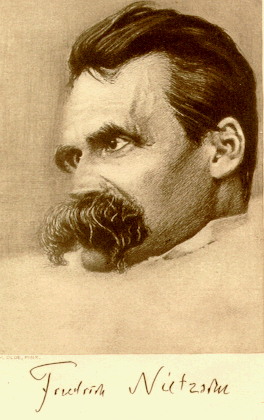Below, some passages of Friedrich Nietzsche’s Ecce homo, translated by Anthony Ludovici:
§ There was not a single abortion that was lacking among them—no, not even the anti-Semite. Poor Wagner!
§ My whole life is essentially a proof of this remark. In vain have I sought among them for a sign of tact and delicacy towards myself. Among Jews I did indeed find it, but not among Germans. I am so constituted as to be gentle and kindly to every one—I have the right not to draw distinctions—, but this does not prevent my eyes from being open.
§ Above all, I have to direct an attack against the German people, who, in matters of the spirit, grow every day more indolent, poorer in instincts, and more honest, who, with an appetite for which they are to be envied, continue to diet themselves on contradictions, and gulp down “Faith” in company with science, Christian love together with anti-Semitism, and the will to power (to the “Empire”), dished up with the gospel of the humble, without showing the slightest signs of indigestion.
§ There is such a thing as the writing of history according to the lights of Imperial Germany; there is, I fear, anti-Semitic history—there is also history written with an eye to the Court, and Herr von Treitschke is not ashamed of himself. Quite recently an idiotic opinion in historicis, an observation of Vischer the Swabian aesthete, since happily deceased, made the round of the German newspapers as a “truth” to which every German must assent.
Let me prove that no other Western philosopher was “one of us.” Either do a contribution to the West’s Darkest Hour (see donate button at the sidebar) or, if you live in the US, go to your second-hand bookstore and purchase Matthew Stewart’s The Truth About Everything: An Irreverent History of Philosophy. In second-hand bookstores a copy of this 1997 book must be just a couple of bucks and you can send it to me by regular mail. (From the country where I am living, Amazon Books’ shipping prices sometimes cost even more than a brand new copy!)
You won’t be disappointed by my chosen excerpts of Stewart’s hilarious book in a new series of posts that I might call “Debunking philosophy” or something like that. Presently I cannot quote it for this blog because I only own a Spanish translation of An Irreverent History of Philosophy, not the original in English.
Thank you for your support.

3 replies on “Was Nietzsche one of us?”
He was such a mixed bag on this issue. On the one side, he hated judaism because he said that the jewish religion was a negation of almost every reality (“The Jewish people chose to exist at any cost, and that cost was reality”). Christianity he hated even more because it does not have a racial component which he saw as the last reality represented in judaism.
He was however pro european union and saw the jews as a part of the makeup of that union. He was therefore not an anti-semite, but anti-judaism and anti-christianity properly speaking.
This is all from Will to Power, a collection of his latest writings. If anti-Semitism is determined by one’s stance on Jews, rather than their stance on other anti-Semites, we can firmly put Nietzsche in that camp.
Nietzsche is pretty silly at times though, contrarian just for the sake of it. For at least some time he went around insisting that he was Polish, and that Poles were the master race who gave Germans all of their culture. There isn’t even any evidence of him actually being Polish.
A lot of his criticism of “anti-Semites” is based on them being Christians, who he sees as “Judaized” themselves, and hypocritical in addition. In some cases he seems to sympathize with contemporary Jews in their criticism of Christianity, but that comes off as a “lesser of two evils” type of deal. Nietzsche doesn’t seem to think of the Jews in a primarily racial manner, although he does allude to some biological deformation in line with them being “priestly parasites” lacking a self-sustaining caste system (and a martial nobility).
(Also I doubt Plato really had anything to do with the Judeans.)
LOL